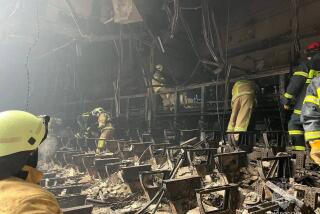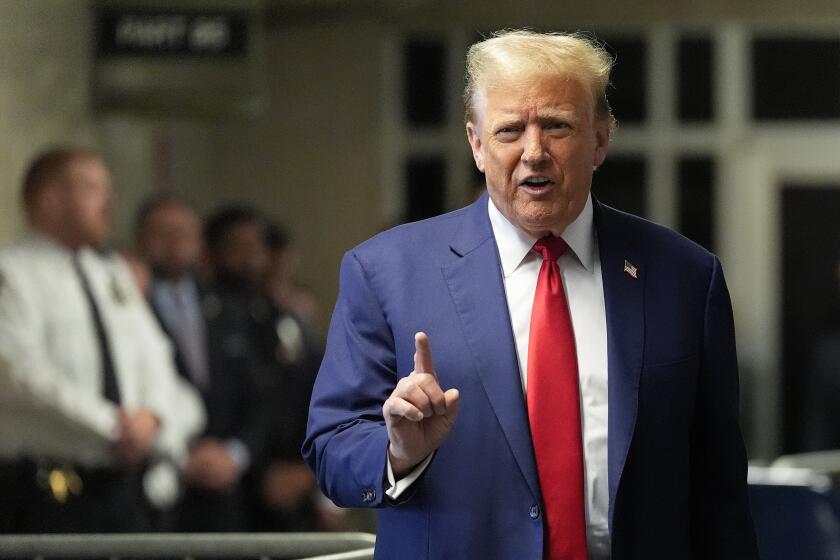Kurds Raid Turk Offices in Europe
Armed Kurdish separatists stormed Turkish diplomatic missions and businesses across Europe on Thursday in an unprecedented campaign of synchronized terror that left one person dead and several injured.
At least 30 people were taken hostage but later released unharmed.
The attacks occurred in more than a dozen cities in six countries--Germany, France, Sweden, Denmark, Switzerland and Britain.
Most of them involved groups of Kurds storming banks, tourism and airline offices and smashing windows and furniture with iron bars and axes before escaping. But the protesters took hostages at the Turkish consulates in Munich, Germany, and Marseilles, France, and unsuccessfully stormed the Turkish Embassy in Bonn and consulates in Lyon, Zurich and Geneva.
The attacks--except for those in London, where attackers rampaged through a Turkish bank, throwing paint--were launched almost simultaneously at 10 a.m. local time, about 1 a.m. Pacific time.
In Ankara, Turkish Foreign Ministry spokesman Volkan Vural said they were planned and executed by the Kurdish Workers Party (PKK), a Marxist group founded in 1978. The group has said its goal is an independent Kurdistan, but its officials sometimes say they are fighting for a system within Turkey that would guarantee Kurdish cultural and political rights.
President Suleyman Demirel said the incidents were “incomprehensible. . . . Whatever they do, they cannot realize their goals. Turkey will stay united and together. They have shown their true faces to our European friends, and they must be punished.”
Vural said Turkey wants the protesters arrested and extradited to Turkey for trial.
The Turkish government also complained that it had alerted European nations to the possibility that its embassies and consulates would be attacked but that the warnings had been disregarded. It also charged that in some instances, police had been slow to react to the violence; the French, Swiss and German ambassadors were called in to receive official protests.
In the Swiss capital, Bern, shots were fired in front of the Turkish Embassy; one Kurdish protester was killed and at least seven other people, including a Swiss policeman, wounded. Turkish Ambassador Kaya Toperi, who had himself wielded a gun, told Turkish television that both Swiss police and protesters had opened fire.
He admitted that he and embassy security men had fired shots into the air “to warn off” protesters armed with sticks, stones and gasoline bombs trying to break into the mission. But Swiss police denied that they had fired live ammunition and said no firearms had been found on the protesters. A prosecutor was quoted by the British news agency Reuters as saying that the incident would be “thoroughly investigated without regard to diplomatic complications.”
In Marseilles, five Kurds claiming to have bombs surrendered after holding 10 people hostage for about three hours in the Turkish Consulate.
Stockholm and Copenhagen also experienced the Kurdish attacks.
However, most of the attacks occurred in Germany, where there were incidents in Berlin, Bonn, Bremen, Hamburg, Hanover, Dortmund, Essen, Frankfurt, Huerth, Mainz, Muenster, Munich and Stuttgart.
There are about 1.8 million Turks living in Germany, and about 400,000 of them are of Kurdish origin. They are a major source of funds for the PKK.
The Kurdish protest lasted longest in Munich, where a 15-hour hostage drama at the Turkish Consulate only ended peacefully shortly before midnight, after a member of Chancellor Helmut Kohl’s Cabinet entered the besieged building and persuaded five young gunmen to surrender.
The 10 remaining hostages were freed unharmed, police said, and the gunmen arrested. Eleven other hostages had been released in batches throughout the day.
The terrorists had threatened to blow up the three-story building or execute their hostages if Kohl failed to meet an ultimatum to denounce the Ankara government on German television by 8:00 a.m. local time Saturday.
The Bonn government refused.
Instead, Bernd Schmidtbauer, chancellery minister without portfolio, spent about an hour meeting with the Kurdish gunmen who had slipped past police guards permanently stationed outside the consulate in a tree-shaded Munich neighborhood.
In Bonn, Turkish Ambassador Onur Oynen said: “We informed German authorities a couple of days ago that the PKK would attack our missions today.”
She said the Turkish authorities had “requested stronger security.”
Munich police acknowledged that general concerns had been raised and said they had responded by increasing security.
“We are not set up to prevent hostage-taking,” police spokesman Walter Renner said at the scene, noting that the terrorists had mingled with the usual crowd of 50 or so people waiting for the consulate to open and slipped inside unnoticed.
The Munich terrorists were armed with pistols and possibly a machine gun, Renner said, adding that it was possible that the weapons had been seized from the consulate’s own arsenal once the militants were inside.
The quiet Munich street was barricaded throughout the day, and residents were warned to stay indoors and keep away from windows facing the consulate building. Sightseers and children on bicycles were kept behind police barricades throughout the evening.
The rash of violent attacks and the demand by the hostage-takers in Munich apparently reflects the military pressure the PKK is under in southeastern Turkey.
For weeks, Turkey has been sending army reinforcements to the region in a buildup for a summer offensive against the PKK. The Kurds in Munich wanted Kohl to demand publicly that Turkey call off the impending campaign that will pit about 100,000 Turkish troops against only about 4,000 Kurdish guerrillas.
One eyewitness on a main road in southeastern Turkey counted more than 40 busloads of Turkish commandos heading toward the mountains one day this week. Another 20 army trucks, apparently carrying ammunition, followed later. Accompanying them were more than 40 civilian trucks of supplies. Their drivers had removed or covered up their license plates for fear of retaliation by the guerrilla forces.
“It’s now just a question of when it starts,” said one Turkish official of the planned offensive.
The Kurdish insurgency is in its ninth year. It has taken at least 6,200 lives and continues to claim about 10 victims a day. A report by the Helsinki Watch human rights group noted in December, 1992: “Both the security forces and the PKK . . . have killed and mistreated civilians.”
The violence has been on the rise since May 24, when the rebels massacred a group of fresh army recruits, unarmed and still wearing their civilian clothes. More than 320 people have died since.
The PKK blames the government, noting that a unilateral cease-fire starting March 21, announced by leader Abdullah Ocalan, was largely ignored by government troops, who killed about 100 of the rebels during a period of peace offered by the leader.
Times staff writer Jones reported from Munich and special correspondent Pope from Istanbul. Times researcher Ulrich Seibert, in Bonn, contributed to this report.
Spree of Violence
Kurdish separatists attacked Turkish embassies, consulates and businesses in five European countries Thursday, taking hostages and staging violent protests. For nine years, Kurdish rebels have fought the Turkish government for an independent state in southeastern Turkey.
SWEDEN 1. Stockholm: Tourist office attacked
DENMARK 2. Copenhagen: Windows smashed at Turkish airline office
GERMANY Turkish-owned targets attacked in at least a half dozen German cities, including: 3. Hamburg 4. Bremen 5. Cologne 6. Munich 7. Frankfurt 8. Berlin
SWITZERLAND 9. Zurich: Turks’ offices attacked 10. Bern: Shootout at Turkish Embassy
FRANCE 11. Lyon: Consulate attacked 12. Mareseille: Consulate seized
BRITAIN 13. London: Bank attacked
More to Read
Start your day right
Sign up for Essential California for news, features and recommendations from the L.A. Times and beyond in your inbox six days a week.
You may occasionally receive promotional content from the Los Angeles Times.





